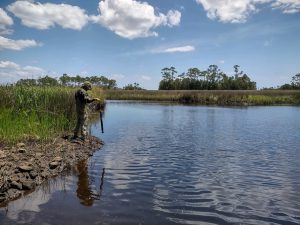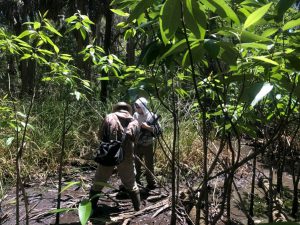Written by 2021 UF/IFAS NCBS Summer Intern, Alex Janelle

I had the amazing opportunity to work with the Suwannee River Water Management District (SWRMD) as a UF/IFAS Nature Coast Biological Station Summer Intern. I was fortunate to be exposed to the many different facets of the SRWMD and its efforts to protect our water resources.
My Time in the Field
Most of my fieldwork comprised of developing a better understanding of the impacts of surface water quality on the success of Florida Corkwood (Leitneria floridana). Corkwood is a rare endemic plant to low-lying coastal swamps and depressions of the Big Bend region and is threatened by habitat loss due to wetland degradation and sea-level rise. We were able to determine that elevation, soil quality, and salinity were the driving factors to determining corkwood success in coastal regions.

I was also able to learn how to service continuous surface water quality monitoring stations. These stations are composed of two sondes that require regular cleaning and replacement and are key for long-term water quality monitoring. They provide very high-resolution data sets that can monitor short-term changes as well. This data is used to make key decisions regarding how our water is used in the SRWMD.

A Huge Thanks
I was amazed to learn of all the different roles that the staff fill at the SRWMD. I was able to assist with wetland delineations, water level sensor maintenance, streamflow measurements for rating curves, and rare species monitoring. This internship truly revealed to me the scope of different career possibilities in water management and how vitally important the management of our precious resources are for the future of our state.
“I would like to especially thank Dr. Marc Minno, Stephanie Armstrong, and the rest of the SRWMD staff for providing such fantastic mentoring, a welcoming environment, and endless learning opportunities. I am also deeply grateful to UF/IFAS and the Nature Coast Biological Station for making this internship possible and for their logistical support.” – Alex
 0
0
